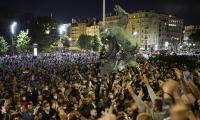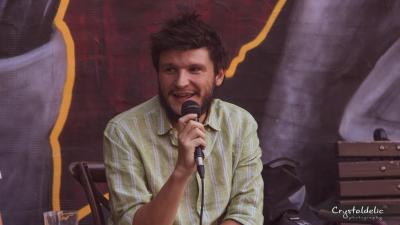Serbian activist protests against electoral fraud: This is how the people fight for democracy
Predrag Momčilović, who is a Serbian activist, researcher, and journalist, shares his thoughts on the recent election and the people's struggle for democracy.

Currently, autocrats around the world are seeking inspiration from Serbia, where electoral fraud and manipulation have contributed to strengthening President Vučić's right-wing populist party in the parliamentary and local elections in December.
However, this is not the whole story.
Thousands of Serbs have demonstrated against the undemocratic election in recent months. Opposition politicians went on hunger strikes, student movements set up roadblocks, and activists stormed the city hall in Belgrade.
One of those who has actively participated and mobilised people is Predrag Momčilović. He is an activist, researcher, journalist, and member of the Serbian Green-Left Front party. Additionally, he is responsible for the party's collaboration with SF, which aims to promote women in politics.
DIPD has interviewed Pedrag Momčilović about the recent election and the people's struggle for democracy.

What, in your opinion, are the impressions of the recent election?
“On December 17, republican parliamentary elections were held in Serbia: elections for the parliament of the autonomous province of Vojvodina and elections for the city of Belgrade.
Extremely undemocratic conditions characterized the pre-election period, with the ruling party dominating the media and all other spheres. The yellow press and politicians from the ruling party attacked opposition pro-European parties daily. On election day, we witnessed pressure on voters, migration of voters, blackmailing of marginalised groups, and other forms of pressure that were confirmed by various both domestic and international organisations.”
One of the major allegations is that the president's party, the Serbian Progressive Party, has organised buses filled with Serbs who do not reside in Belgrade to cast their illegal votes. These actions could potentially have contributed to tipping the balance of power in Belgrade in favour of the SNS.
“After the elections, pro-European opposition parties organised several protests to point out the irregularity of the elections, and the activities continued at the international level. The absence of a formed government in Serbia necessitates repeating the elections in Belgrade to elect the mayor and the city government.
In general, the situation in Serbia is becoming more and more undemocratic, and various international institutions describe this regime as a hybrid with strong authoritarian tendencies. The conditions for democratic elections are getting worse every time, and with the latest electoral fraud, the question is whether the citizens can soon regain confidence in democratic processes.”
Serbia has a long-standing tradition of activism. Over the years, there have been numerous protests against President Vučić.
SF collaborates with the Serbian party Green Left Front to strengthen women's influence and representation in local politics. The partnership is part of a multi-party project involving S, V, K, EL, and RV.
Green Left Front is a newly established political party stemming from the social movement "Do not let Belgrade drown," rooted in feminist principles. Currently, the party is working to expand from Belgrade to Serbian rural areas ahead of the local elections in June or July 2024 and currently has 20 local party branches.
Recently, as part of its partnership with SF, Green Left Front established the "Autonomous Women Front," an independent women's group within the party, to support female members and candidates.
What are your personal insights into Serbia's longstanding tradition of activism?
“The Green-Left Front is a new political party that is the successor to the Ne davimo Belgrade movement (Do not let Belgrade drown movement), which is based on activism against the city's devastation. As the possibilities for institutional change are limited, activism becomes and remains one of the primary mechanisms of struggle. In Serbia, there are more and more movements and initiatives by citizens against ecologically and energetically harmful projects, urban devastation, social inequalities, etc.
The Green-Left Front's activism starts with the belief that citizens' lives are crucial political issues in our society. Until we secure employment, do we receive sufficient compensation for it? When we get sick, is there anyone to treat us? Can we receive education? Is there room for every child in kindergarten? How long do we wait for the bus, and can we get to work in a reasonable amount of time? Are our cultural, historical, and natural monuments for the profit of the privileged elite or for all our citizens to enjoy? As well as whether our laws apply equally to all citizens regardless of religious, national, political, economic, or sexual affiliation.”
Since May 2023, thousands, and at times even tens of thousands, of citizens have repeatedly participated in demonstrations in Belgrade. After the election, the intensity only increased, leading to the organisation of demonstrations weekend after weekend.
Many media suggest that autocrats in other countries should look to Serbia for inspiration when conducting elections. In your opinion, what lessons can resistance movements draw from the Serbian people when confronting a figure like Vučić?
“The President of Serbia, Aleksandar Vučić, has very good relations with the presidents of Turkey, Hungary, and other countries that have authoritarian leaders. That is why there is a legitimate fear that the problems with the elections may spread to other countries as well. That is why opposition activists should learn from each other.
As opportunities for institutional change are limited, activism remains one of the primary mechanisms in the struggle.
What we can offer as the Green-Left Front is the experience of working with citizens in a situation where media freedoms are extremely limited and where institutions act against you. In the fight against authoritarian leaders, we see organizing from below as the most effective solution. That's why it's important to be present in every neighbourhood, talk to citizens, and deal with their daily problems.”
After the election, the youth in Serbia have actively participated in pro-democratic activism against the government. This marks a significant change from the past, where political apathy was widespread, especially among the young population. However, the autocratic methods employed by President Vučić have triggered a strong culture of dissent among the youth, who are now more engaged in street activities.
Considering the changing perceptions of democracy among the youth since the last election, how would you describe their current engagement in the political system, and why is this topic especially relevant today?
“Young people's interest in politics and involvement in political parties is still at a low level because they often perceive politics as something dirty and corrupt. And yet, after the last elections, we saw an increase in young people's involvement in exposing electoral fraud and raising awareness among young people about the undemocratic nature of the current regime.
Young people represent a key element in the fight against authoritarian regimes, as we saw in Poland, young people and women played a key role in the fight against authoritarian regimes. The Serbian Green Youth joined the Green Left Front. In the coming period, the plan is to work on giving young people as much space as possible.”